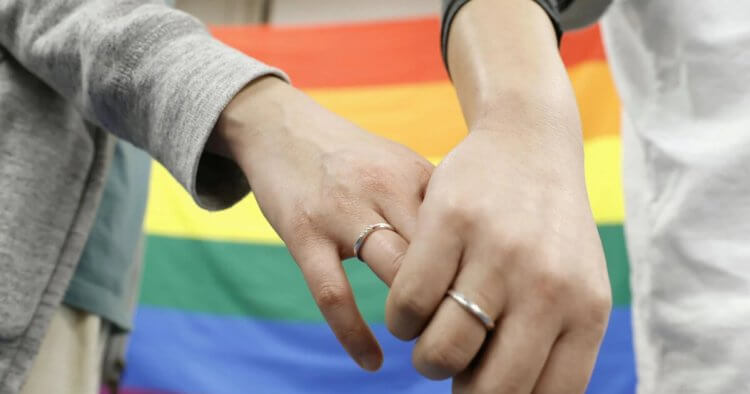Much to the disappointment of LGBTQ+ activists amid Pride Month, a Japanese court ruled this week that Japan’s same-sex marriage ban didn’t violate its constitution.
Judge Doi Fumi of the Osaka District Court determined on Monday that Article 24 of Japan’s Constitution didn’t confer protections on gay marriage. The plaintiffs were three same-sex couples, two male and one female, who filed for 1 million yen in damages per couple, or about $7,400; they plan to appeal the ruling to the Osaka High Court.
The district court agreed with the government’s argument that the purpose of marriage was reproduction, according to translations of Yahoo! Japan. The court added that the system of marriage served a greater “pragmatic purpose” of “protecting men and women to bear children and raise them.”
1. Osaka district court sided with the argument from the country of Japan which said that the "purpose of marriage was reproduction" & agreed with the definition that "marriage is a relationship between a man & a woman to bear children and raise them together in cohabitation." pic.twitter.com/7FN0dJ0Cx3
— 箕島 綺譚(they/them) 💖 Support Black Trans Liberation (@MishimaKitan) June 21, 2022
“Marriage shall be based only on the mutual consent of both sexes and it shall be maintained through mutual cooperation with the equal rights of husband and wife as a basis,” reads the Constitution of Japan.
One of the plaintiffs, Machi Sakata, told Reuters that she doubted that the legal system was working. It appears that Sakata and her partner, a U.S. citizen, were relying on the ruling ahead of the birth of one of their children.
“I think there’s a possibility this ruling may really corner us,” said Sakata.
According to a translation provided by BBC, the district court opinion did speculate in its ruling that individual dignity may necessitate marriage benefits for same-sex couples.
“From the perspective of individual dignity, it can be said that it is necessary to realise the benefits of same-sex couples being publicly recognised through official recognition,” read the ruling.
This latest ruling follows similar lawsuits filed in Sapporo, Tokyo, Osaka, Nagoya, and Fukuoka by multiple same-sex couples in 2019. The Sapporo District Court ruled last March that the same-sex marriage ban was unconstitutional, citing Article 14 of the Constitution of Japan requiring equal laws for all Japanese citizens.
“All of the people are equal under the law and there shall be no discrimination in political, economic or social relations because of race, creed, sex, social status or family origin. Peers and peerage shall not be recognized,” reads the article.
Although Japan bans same-sex marriage, local governments have been recognizing same-sex partnerships for years. The city in which the district court lies, Osaka, offers that recognition. It was also first in the country to recognize two gay men as foster parents in 2017.
Last week, the government of Japan’s capital, Tokyo, adopted legislation to grant recognition certificates to same-sex couples starting in November. Out of Japan’s 47 prefectures, nine now recognize same-sex partnerships. About a quarter of Tokyo’s 62 municipalities were already granting those certificates.
Certificate acknowledgement ensures that same-sex couples enjoy certain marital benefits like hospital visitation rights. However, perks like joint tax filing and spousal inheritance are reserved for married couples.
In addition to the U.S., 30 other countries have legalized gay marriage: Chile, Switzerland, Costa Rica, Ecuador, Taiwan, Austria, Australia, Malta, Germany, Colombia, Greenland, Ireland, Finland, Luxembourg, Scotland, England and Wales, Brazil, France, New Zealand, Uruguay, Denmark, Argentina, Portugal, Iceland, Sweden, Mexico, Norway, South Africa, Spain, Canada, Belgium, and Netherlands.
The latest country to legalize gay marriage was Chile, through legislation signed into law last December. Netherlands was the first to legalize gay marriage in 2001.
This is an excerpt from The Daily Wire.
















